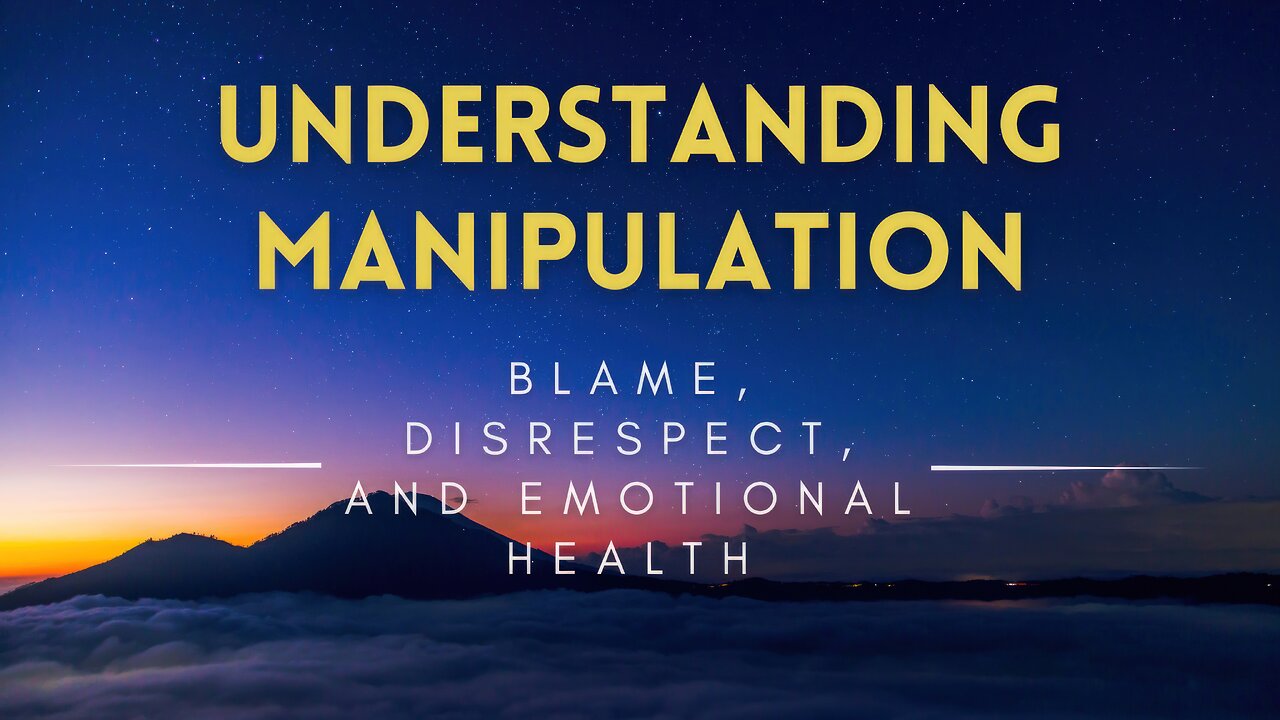Premium Only Content

54 - Understanding Manipulation - Blame, Disrespect, and Emotional Health
Ever find yourself questioning your reactions to someone's hurtful behavior, wondering if you're too sensitive or making a big deal out of nothing? Drs. George K. Simon and Darlene Lancer, alongside Drs. Preston Ni and Susan Kraus Whitbourne, guide us through the maze of manipulation and its chilling effects on our emotional well-being. In this candid discussion, we dissect the deceitful art of blame shifting, where the perpetrator projects their disrespect onto the victim, triggering a spiral of self-doubt and anxiety. Whether it stems from a desire for dominance or an attempt to camouflage deep-seated insecurities, manipulation can fracture the very foundations of our trust in ourselves and others.
Armed with expertise from renowned psychologist Dr. Ramani Durvasula, this episode equips you with the tools to spot the telltale signs of manipulation and safeguard your sense of self. From inconsistent behavior to unsolicited flattery, learn to recognize the red flags and take decisive action to set boundaries that honor your worth. Through illustrative scenarios, we offer strategies on how to confront manipulative tactics with poise and assurance. It's a masterclass in transforming from a target of manipulation to an advocate for your own psychological integrity, ensuring that when faced with manipulation, you are prepared to stand firm and let your voice be acknowledged.
#I4L, #informationforlife #blameshifting #emotionalhealth #manipulation #mentalhealth #selfhelp #personaldevelopment #relationships #psychology #settingboundaries #assertiveness #gaslighting #lovebombing #triangulation #understandingmanipulation #knowledgeispower #empowerment #narcissisticpersonality #selfesteem #emotionalwellbeing
References:
Durvasula, R. (2018). Don't You Know Who I Am? How to Stay Sane in an Era of Narcissism, Entitlement, and Incivility. Post Hill Press.
Goulston, M. (2011). Just Listen: Discover the Secret to Getting Through to Absolutely Anyone. AMACOM.
Hare, R. D., & Babiak, P. (2006). Snakes in Suits: When Psychopaths Go to Work. Regan Books.
Kahn, L. (2014, March 11). How to handle manipulators. Psychology Today. https://www.psychologytoday.com/us/blog/lifetime-connections/201403/how-handle-manipulators
Lancer, D. (2014). Codependency for Dummies. John Wiley & Sons.
McKay, M., & Fanning, P. (2016). Self-Esteem: A Proven Program of Cognitive Techniques for Assessing, Improving, and Maintaining Your Self-Esteem. New Harbinger Publications.
Paterson, R. J. (2000). The Assertiveness Workbook: How to Express Your Ideas and Stand Up for Yourself at Work and in Relationships. New Harbinger Publications.
Simon, G. K. (2010). In Sheep's Clothing: Understanding and Dealing with Manipulative People. Parkhurst Brothers Publishers.
University at Buffalo School of Social Work. (n.d.). Developing your support system. https://socialwork.buffalo.edu/resources/self-care-starter-kit/additional-self-care-resources/developing-your-support-system.html
Van der Kolk, B. (2014). The Body Keeps the Score: Brain, Mind, and Body in the Healing of Trauma. Viking.
Whitbourne, S. K. (2012). The Two Faces of Narcissism in Romantic Relationships. Psychology Today. Retrieved from https://www.psychologytoday.com/us/blog/fulfillment-any-age/201704/the-two-faces-narcissism-in-romantic-relationships
-
 1:23:41
1:23:41
Game On!
20 hours ago $7.58 earnedNetflix NFL Christmas Games Preview and Predictions!
41.5K9 -
 2:05:07
2:05:07
Darkhorse Podcast
1 day agoWhy Trump Wants Greenland: The 257th Evolutionary Lens with Bret Weinstein and Heather Heying
277K441 -
 8:50:58
8:50:58
Right Side Broadcasting Network
1 day ago🎅 LIVE: Tracking Santa on Christmas Eve 2024 NORAD Santa Tracker 🎅
302K43 -
 2:48
2:48
Steven Crowder
1 day agoCROWDER CLASSICS: What’s This? | Nightmare Before Kwanzaa (Nightmare Before Christmas Parody)
292K12 -
 33:49
33:49
Quite Frankly
1 day agoThe Christmas Eve Midnight Telethon
102K22 -
 2:12:46
2:12:46
Price of Reason
23 hours agoAmber Heard BACKS Blake Lively Lawsuit Against Justin Baldoni! Is Disney CEO Bob Iger in TROUBLE?
56.9K23 -
 1:01:17
1:01:17
The StoneZONE with Roger Stone
18 hours agoChristmas Edition: Why the Panama Canal is Part of the America First Agenda | The StoneZONE
127K47 -
 18:12:15
18:12:15
LFA TV
1 day agoLFA TV CHRISTMAS EVE REPLAY
142K19 -
 13:32
13:32
Scammer Payback
19 hours agoChanging the Scammer's Desktop Background to his Location
12.2K3 -
 4:21
4:21
BIG NEM
21 hours agoNikola Tesla's Secret to Cultivating Creativity & Genius
8.76K1